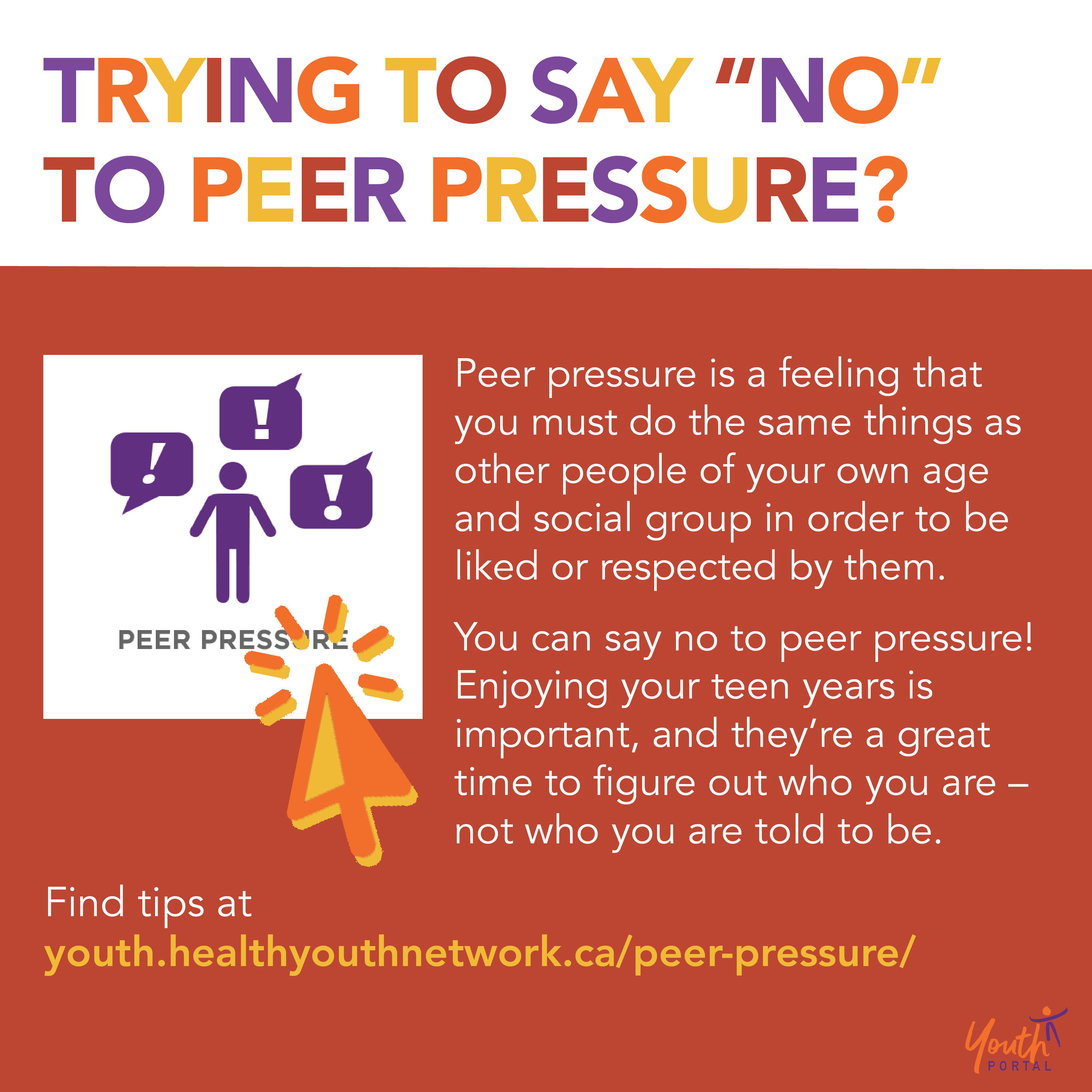Peer pressure is a pervasive phenomenon that influences individuals across various stages of life, particularly during adolescence. The desire for acceptance and belonging often compels individuals to conform to the behaviors and attitudes of others, sometimes against their better judgment. However, developing the ability to say no to peer pressure is essential for fostering a strong sense of self and ensuring personal integrity. This article elucidates several top strategies for resisting peer pressure, with an emphasis on cultivating self-efficacy, enhancing communication skills, and reinforcing personal values.
Recognizing the Mechanisms of Peer Pressure
To effectively combat peer pressure, one must first grasp its underlying mechanisms. Peer pressure often manifests in two distinct forms: direct and indirect. Direct peer pressure entails overt encouragement or coercion from peers to engage in certain behaviors, such as substance abuse or risky activities. Indirect peer pressure, conversely, arises from societal norms or group behaviors that create an implicit expectation to conform.
Self-awareness is paramount in recognizing these pressures. Individuals must engage in introspective practices to identify their values and preferences in order to create a coherent identity separate from their peers. By doing so, they can differentiate between genuine desires and those influenced by the expectations of others. Furthermore, individuals should consider the potential repercussions of yielding to peer pressure, including negative impacts on mental health, self-esteem, and personal relationships.
Cultivating Assertiveness: The Backbone of Refusal
Assertiveness is a crucial skill for resisting peer pressure effectively. It empowers individuals to express their feelings, beliefs, and needs clearly and confidently while respecting others. To cultivate assertiveness, one might consider several strategies.
Firstly, practicing clear communication techniques is essential. Employing “I” statements can foster a non-confrontational environment. For instance, rather than saying, “You’re wrong for wanting to go out drinking,” one could assert, “I feel uncomfortable with the idea of drinking.” This approach minimizes defensiveness in peers and facilitates open dialogues.
Secondly, role-playing scenarios with trusted friends or mentors can enhance one’s assertiveness in real-life situations. By rehearsing responses to various peer pressure scenarios, individuals can build confidence in their refusal skills. This can be especially productive in environments perceived as challenging, such as high school or college parties, where peer influence is often intensified.
Additionally, body language plays a pivotal role in assertiveness. Maintaining eye contact, adopting an upright posture, and using a steady voice conveys confidence and decisiveness. These non-verbal cues reinforce spoken words, creating a cohesive expression of refusal.
Fortifying Personal Values: The Foundation of Resistance
Another effective strategy for resisting peer pressure involves fortifying personal values and beliefs. Individuals must not only identify what they stand for but also develop a commitment to these principles. This foundational aspect serves as a moral compass, guiding decisions in the face of pressure.
Engagement in extracurricular activities, volunteering, or joining organizations that align with one’s values can significantly reinforce commitment to these beliefs. Such activities foster a sense of community and provide alternative social circles that share similar values, thereby mitigating the influence of peers whose behaviors do not align with one’s principles.
Moreover, introspective exercises, such as journaling about personal experiences and values, can clarify one’s motivations and enhance self-esteem. A stronger sense of self-worth diminishes the need for external validation, often the driving force behind succumbing to peer pressure.
Understanding Consequences: Building a Cognitive Framework
Awareness of the potential consequences of conforming to peer pressure is crucial for mitigating its influence. Individuals must cultivate a cognitive framework that allows them to weigh the short-term benefits of conforming against the long-term repercussions of such choices.
For example, engaging in substance use may provide immediate social gratification but can lead to long-lasting issues such as addiction, legal problems, or health deterioration. By fostering critical thinking, individuals can better evaluate their decisions and make informed choices that align with their long-term goals and values.
Encouraging Peer Support: The Role of Allies
In combating peer pressure, the significance of forming supportive peer networks cannot be understated. Surrounding oneself with affirming peers significantly bolsters the capacity to resist conformity. Positive influences create an environment where individuals feel empowered to express dissenting opinions without fear of social ostracism.
Individuals can initiate this network by seeking like-minded friends and engaging in communities that promote positive behavior. Establishing these relationships not only cultivates resilience against peer pressure but also fosters a sense of belonging that does not rely on compromising personal values.
Understanding Emotional Triggers: A Path to Empowerment
One’s emotional landscape often interacts intricately with peer pressure dynamics. Emotional triggers, such as feelings of inadequacy or fear of exclusion, can amplify susceptibility to peer conformity. Therefore, recognizing and managing these emotions is vital for empowerment.
Emotion regulation strategies, including mindfulness and cognitive restructuring techniques, can significantly bolster an individual’s capacity to resist peer pressure. Mindfulness encourages self-awareness and cultivates a non-judgmental observation of emotions, enabling individuals to respond authentically rather than react impulsively.
Cognitive restructuring, on the other hand, involves challenging irrational beliefs associated with social acceptance. By reframing negative thoughts—such as “If I don’t do this, I won’t be liked”—individuals can develop a healthier narrative that supports their decision to prioritize personal integrity over the pursuit of social acceptance.
In Conclusion: Embracing Individuality in a Conformist Society
The journey to resist peer pressure entails a multifaceted approach that encompasses self-awareness, assertiveness, commitment to personal values, cognitive evaluation of consequences, and emotional management. By understanding the intricacies of peer pressure and actively developing effective strategies to counter it, individuals can embrace their individuality while navigating the complexities of social interactions.
Ultimately, developing the courage to say no to peer pressure enhances personal autonomy and fosters a culture that values diversity of thought and behavior. As society continues to evolve and new pressures emerge, cultivating these skills remains vital in empowering future generations to remain true to themselves.
